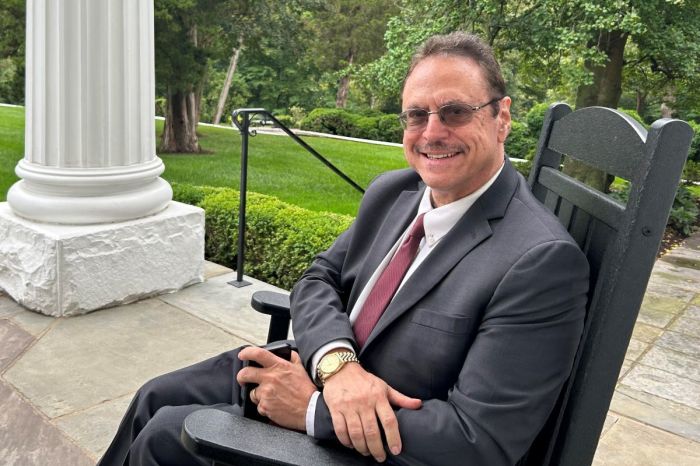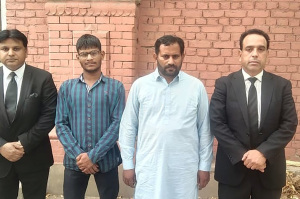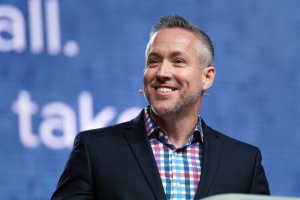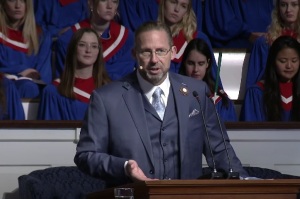Evangelical leaders huddle in DC to discuss how to best stand with the Jewish state

Interview with Latino Christian leader Mario Bramnick
Following the meetings on Tuesday and Wednesday, I sat down for a one-on-one interview with Pastor Mario Bramnick, president of the Latino Coalition for Israel.
Here is a portion of our conversation, lightly edited for clarity.
ROSENBERG: Mario, what are you trying to achieve? Let's start with that objective.
BRAMNICK: To call us, as presidents of Christian organizations and other key Christian leaders, to do more in support of Israel in the current political climate, in the face of the rising anti-Israel, antisemitic sentiment that we're seeing in universities and on our streets. It is so critical that we need to unite. I don't think any one organization — there's many great organizations doing a lot of work alone — will be able to bring forth what's necessary to turn the tide of this anti-Israel sentiment in America.
ROSENBERG: It seems like what you're trying to say —and listening to the last 3.5 hours or so — is that there's a need for a far more effective and laser-like focus from the most senior leadership in the Evangelical pro-Israel community in terms of our messaging and social and policy impact. Is that a fair assessment?
BRAMNICK: That is. And the name — Conference of Christian Presidents for Israel — came out of the Conference of Presidents of Major Jewish Organizations that's been in existence for several years. And they have had an influence on the world. And if the Jewish population is 2%, and the Christian population in America is 30% — not that all of the Christians in America are pro-Israel, but a substantial percentage of the Christian population is in support of Israel — we can and should do more to coalesce our voice, our support on a grassroots basis, on policy, and on the executive and legislative branches both in state and national government. It's quite a voice. We need to use it better.
ROSENBERG: What was the goal of these meetings here in the Washington, D.C., area this week?
BRAMNICK: Well, we had the reception last night [Tuesday]. And, in addition to forms of Evangelical leaders, former U.S. Ambassador to Israel David Friedman was here. Brooke Rollins, the president of America First Policy Institute, also spoke to us. Elan Carr, who served as the U.S. special envoy Combating Anti-Semitism, was here. He’s now president of the Israeli American Council. And Caroline Glick, the Israeli American columnist, was here yesterday and today.
So, we laid out the need and vision pretty much last night and got into more specifics today. As you saw, we're at such a critical crossroads. Nobody ever would have thought that America would be where it's at right now vis-a-vis Israel, or imagined how necessary it would be to have to defend Israel so much more than in the past. You know, in the Bible we see that God had Queen Esther in a place of prominence before the Haman Decree [which ordered the total annihilation of the Jewish race]. We've seen a lot of Haman Decrees from the enemies of Israel and the Jewish people in our lifetime. But we're worried that there may be a more intensive decree coming. And I think this is God's way of waking up the Esthers and the Mordechais to stand against any negative opposition to Israel, the statehood of Israel, and the safety and freedom of the Jewish people.
ROSENBERG: True — and in some ways it strikes me that this was a room of Mordechais. By that, I mean that Esther actually was the queen. She was in the palace. While she didn't have final decision-making authority, she was in the royal family. She had the ear of the king. Mordechai did not. If the king was going to listen to Godly wisdom and sound thinking at all, Esther was the right one to speak the truth on love to him. But Mordecai has a critical role to play. He needed to understand the magnitude of the threat to the Jewish people. He needed to pray and fast. But he also needed to be the critical influencer at a critical moment. He needed the courage and channel to speak to the Queen, explain the situation to her, urge her to pray and fast, and encourage her to speak directly to the King to stand with the children of Israel and stand against the slaughter of the Jewish people. None of us are presidents or prime ministers. We’re not kings or crown princes. Nor are we married to such powerful leaders. But we can humbly and prayerfully serve as Mordechais, speaking truth to power, and that's a very critical role right now.
BRAMNICK: Absolutely. I think everyone would agree that what we're seeing in America, we've never seen before. It’s very troubling for our nation on many, many fronts, and specifically for Christians, on many, many fronts. There is an anti-Christian sentiment that's rising in America, as well as an anti-Jewish sentiment. It's the same forces that are coming against people of faith. So, standing with the Jewish people — standing Christians and Jews together as one — is something I’m very passionate about and an important element of what we’re trying to accomplish.
ROSENBERG: OK, so, just to be clear, Mario, you had a number of very influential Jewish leaders speaking last night and today, interacting with dozens and dozens of Evangelical leaders. But most of the Evangelicals are not ready to formally go public with your initiative, to create a Conference of Presidents of Christian Organizations in Support of Israel. They're still trying to understand exactly the structure. They’re trying to understand why it should be different from Christians United For Israel (CUFI) — or Americans Christian Leaders for Israel (ACLI) — or whether it should really be an updated and enhanced fusion of the two. They also need to see the first set of policy positions and statements that you and your colleagues are drafting. But the point was, you had a strategy meeting and you believe you are ready to launch, or close to being ready.
BRAMNICK: Correct. At this point, we have a summary of what we would like to accomplish. Our next steps are going to be working on the mission/vision statement, core values, and circulating it to the pastors.
Excerpts from the invitation sent to Evangelical leaders
"We cordially extend this invitation to you to join us on our launch of the Conference of Presidents of Christian Organizations in Support of Israel on September 17th and 18th.
We are inviting the top 100 presidents of Christian Organizations and influential Christian leaders to join in launching this important coalition. These leaders represent tens of millions of evangelicals in America and this coalition will advance pro-Israel policy at the executive, legislative and state levels, and mobilize major grassroots efforts to strengthen the United States-Israel relations at this critical crossroad in our nation’s history and will build a firewall against the unprecedented rise of antisemitism in America.
No one organization alone will be able to accomplish what a coalition of the leading Christian voices can, on behalf of the US-Israel alliance and in combatting antisemitism.
We are honored to have with us at the launch former U.S. Ambassador to Israel the Honorable David Friedman; President of the Israeli-American Council and Former Special Envoy Combatting Antisemitism, the Honorable Elan Carr; and Vice Chairman of the Conference of Jewish Presidents, Malcolm Hoenlein."
This article was originally published by All Israel News.
Joel C. Rosenberg lives in Jerusalem and is the Editor-in-Chief of ALL ISRAEL NEWS and ALL ARAB NEWS, a New York Times best-selling author, Middle East analyst and Evangelical leader.





























